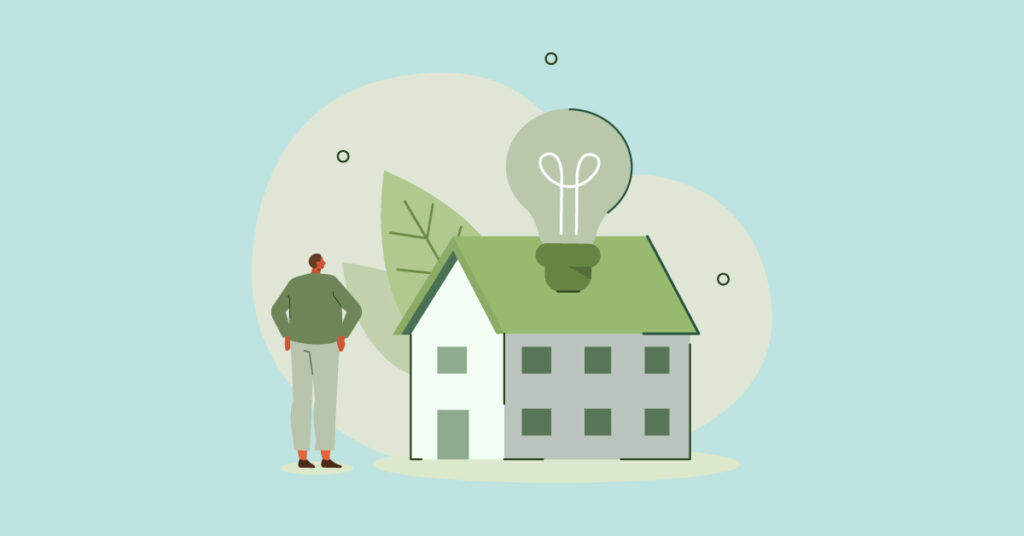In an era of rising energy costs and growing environmental concerns, making your home more energy-efficient is a smart investment. It not only reduces your carbon footprint, it also saves money on monthly utility bills. In this comprehensive guide, we’ll explore the top eight energy-efficient home improvements that contribute to a greener planet and keep more green in your wallet.
From simple upgrades to more significant renovations, several options are available for various budgets and goals. Let’s dive in and discover how you can make your home more energy-efficient while saving money in the process.
Why to Make Your House Energy Efficient
Making your house energy-efficient offers a wide range of benefits that extend beyond simply saving money on utility bills. Here are several reasons to consider improving the energy efficiency of your home:
Cost Savings
Energy-efficient homes consume less energy, which translates into lower energy bills. Over time, these savings can add up significantly, reducing your overall cost of living.
Environmental Impact
Reducing energy consumption lowers greenhouse gas emissions, helping combat climate change. Contributing to a healthier environment also creates a more sustainable future by making your home more energy-efficient.
Improved Comfort
Energy-efficient homes are often more comfortable. Proper insulation, draft reduction and efficient heating and cooling systems create a more consistent and pleasant indoor environment year-round.
Increased Home Value
Energy-efficient features usually increase the resale value of your home. Many homebuyers are willing to pay more for homes with lower operating costs and a smaller environmental footprint.
Government Incentives
Many governments offer financial incentives, tax credits, and rebates for energy-efficient home improvements. Taking advantage of these programs can further reduce the upfront cost of upgrades.
Enhanced Indoor Air Quality
Energy-efficient homes often have better ventilation and air quality. Proper sealing and insulation can prevent outdoor pollutants from entering your home, promoting healthier living conditions.
Better indoor air quality and temperature regulation can positively affect your health. Energy-efficient homes often have lower humidity levels, reducing the risk of mold growth and other health issues.
Extended Lifespan of Appliances
Efficient homes put less strain on appliances and systems like HVAC units, which can extend their lifespan. This means fewer replacements and less waste.
Top Ways to Make Your Home Energy Efficient

Here are the top ways to make your home more energy efficient today.
Energy-Efficient Lighting
Replacing incandescent bulbs with energy-efficient LED or CFL (Compact Fluorescent Lamp) bulbs is one of the most cost-effective (and easiest) ways to reduce energy consumption. LED bulbs last longer, emit less heat, and use significantly less electricity, resulting in lower energy bills and fewer bulb replacements.
Smart Thermostats
Smart thermostats like Nest or ecobee offer precise control over your heating and cooling systems. They can learn your preferences, adapt to your schedule, and optimize temperature settings to reduce energy waste. You can save up to 20% on your energy bills by preventing unnecessary heating or cooling.
Proper Insulation and Sealing
A well-insulated and properly sealed home retains conditioned air, preventing drafts and energy loss. Insulating your attic, walls, and floors and sealing gaps around windows and doors can significantly reduce heating and cooling expenses.
Energy-Efficient Windows
Upgrading to energy-efficient windows can enhance insulation and minimize heat transfer. These windows keep your home comfortable year-round and reduce the load on your HVAC system.
High-Efficiency HVAC Systems
Investing in a high-efficiency heating, ventilation, and air conditioning (HVAC) system can lead to substantial energy savings. These systems operate more efficiently by using less energy to maintain the desired temperature in your home.
Solar Panels
Solar panels are a longer-term investment than other options on this list, but they can significantly reduce your reliance on grid electricity. They harness the power of the sun to generate clean, renewable energy, lowering your energy bills and possibly selling excess energy back to the grid.
Tankless Water Heaters
Tankless heaters heat water only when needed, eliminating the standby energy losses that happens with traditional water heaters. They provide hot water on-demand, reducing energy consumption and costs.
Landscaping and Shading
Strategic landscaping with shade trees and shrubs can block the sun’s rays, reducing heat gain in your home during the summer. Additionally, exterior shading devices like awnings or pergolas can protect windows from direct sunlight, further lowering cooling costs.
Investing in energy-efficient home improvement benefits your wallet and contributes to a more sustainable and eco-friendly future. Whether you start with simple changes like LED lighting or embark on more significant projects like solar panel installation, each step brings you closer to a greener, cost-effective, and energy-efficient home.
You might also be interested in: 13 Ways To Prep Your Home For Winter




